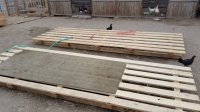You are using an out of date browser. It may not display this or other websites correctly.
You should upgrade or use an alternative browser.
You should upgrade or use an alternative browser.
Will The US Dollar Collapse?
- Thread starter baymule
- Start date
Jshubin
Power Conserver
Mini Horses
Sustainability Master
Have said before, it is just amazing at how much was accomplished by those before us who raised families & lived with their needs met from pure hard work!! Hard work seems to be the key (along with sage advice & experience for weather, animal husbandry, etc) and some planning.
frustratedearthmother
Sustainability Master
LOL - all this reminds me that I told my DH the other day that I can't wait to retire so I can work harder and make less money!
- Thread starter
- #52
baymule
Sustainability Master
A friend of mine was raised on a farm in Arkansas during the depression. Everyone was poor. They always had to plenty to eat because they raised vegetables, had a milk cow and pigs. They raised cotton and corn for cash crops and farmed with mules. Her mother canned vegetables and fruits in quart jars that lined the wall in the basement which also doubled as a root cellar. In town was another matter. She had a friend that invited her to spend the night and she still remembers there was practically nothing to eat. Another girl stole her lunch at school because she was hungry.
So if hard times come, at least we can have something to eat. At least we'll have something to trade or sell. So bleak though it might sound, we will be waaaaay ahead of people living in towns or people that have no idea where real food comes from.
So if hard times come, at least we can have something to eat. At least we'll have something to trade or sell. So bleak though it might sound, we will be waaaaay ahead of people living in towns or people that have no idea where real food comes from.
I wonder if it would be informative to read about history of other countries where terrible inflation has been experienced.
Real estate is probably the wrong term. I meant arable land, whether for farming or timber. If you own land, you have some security. The best would be to own land in different areas of the country, which is a hedge against geopolitical problems and climate changes.
BTW, if you've got the house paid off, you're ahead of most of us!
Real estate is probably the wrong term. I meant arable land, whether for farming or timber. If you own land, you have some security. The best would be to own land in different areas of the country, which is a hedge against geopolitical problems and climate changes.
BTW, if you've got the house paid off, you're ahead of most of us!
Britesea
Sustainability Master
Sometimes, I look around at our property, with all the improvements we've made... and I wonder if it will be my family living here after some kind of collapse, or if there will be some stranger turning to her husband and saying "These people sure had strange tastes in books, honey" because we were in the wrong place at the wrong time when it happened. *sigh* que sera, sera. Hopefully SOMEONE will be able to thrive here.
- Thread starter
- #2
baymule
Sustainability Master
Should have posted this one first. Oh well. Being self sufficient is more than buying a dehydrator or pressure canner. Sure, these things help and are important. But I believe being educated in world events are just as important. You may think that these events and upcoming events don't pertain to you, and they may not. But how will a dollar devaluation affect your children and grand children? Will we go over the edge into poverty and slide so deep in the abyss that our children or grand children never know the good life, such that we had?
August 23, 2016
Santiago, Chile
In July 1944, just weeks after the successful Allied invasion of Normandy, hundreds of delegates from around the world gathered in Bretton Woods, New Hampshire to determine the future of the global financial system.
The vision was simple: America would be the center of the universe, and every other nation would revolve around the US.
This arrangement ultimately led to the US dollar being the world’s dominant reserve currency which still remains today.
Whenever a Brazilian merchant pays a Korean supplier, that deal is negotiated and settled in US dollars.
Oil. Coffee. Steel. Aircraft. Countless commodities and products across the planet change hands in US dollars, so nearly every major commercial bank, central bank, multi-national corporation, and sovereign government must hold and be able to transact in US dollars.
This system provides a huge incentive for the rest of the world to hold trillions of dollars worth of US assets-- typically deposits in the US banking system, or US government bonds.
It’s what makes US government debt the most popular “investment” in the world, why US government bonds are considered extremely liquid “cash equivalents”.
As long as this system continues, the US government can continue to go deeper into debt without suffering serious consequences.
Just imagine being totally broke... yet every time you want to borrow money there’s a crowd of delighted lenders eager to replenish your wallet with fresh funds.
This may be the US government’s #1 advantage right now.
You’d think that they would be eternally grateful and take care to never abuse this incredible privilege.
But no… not these guys.
In fact, they’ve done the exact opposite. Over the last eight years the US government has gone out of its way to eliminate as much of this benefit and alienate as many allies as possible.
They’ve abused the trust and confidence that the rest of the world placed in them by racking up record amounts of debt, waging indiscriminate wars in foreign lands, and dropping bombs on children’s hospitals by remote control.
They’ve created absurd amounts of regulations and had the audacity to expect foreign banks to comply.
Plus they’ve levied billions of dollars worth of fines against foreign banks who haven’t complied with their ridiculous regulations.
(Last week, for example, New York state financial regulators fined a Taiwanese bank $180 million for not complying with NY state law.)
And they’ve threatened to banish any foreign banks from the US financial system who don’t pay their steep fines.
Abuse. Deceit. Extortion. Not exactly great ways to win friends and influence people.
It’s as if Barack Obama pulled together the smartest guys he could find to make a list of all the ways the US government would have to screw up in order to lose its enormous financial privilege… and then he went out and did ALL of them.
The US government is practically begging the rest of the world to find an alternative to the US dollar and US banking system.
Even the government of France, a key US ally, called into question continued US dominance of the global financial system after the US government slammed French bank BNP Paribas with a $9 billion fine.
There have already been some attempts to displace the United States in the financial system.
China has been aggressively setting up its own competing financial infrastructure, something called the China International Payment System.
It’s been a slow start for the Chinese, but they’re building momentum. Though I’m not sure China is the answer in the long run.
While banks around the world may not care for the long and strong arm of the US government, the Chinese government doesn’t exactly inspire trust either.
But now there really is an alternative. Technology.
Ripple, a blockchain-style protocol that’s funded by Google Ventures (among others), is now being utilized by international banks to send and receive transactions directly.
The way international bank transfers work now relies exclusively on the US financial system.
Large foreign banks have what’s called a “correspondent account”, typically at a major US bank like JP Morgan, Citibank, etc.
A correspondent account is essentially a bank account for other banks. Our
company holds funds at a bank in Singapore, for example, whose US dollar correspondent account is at Bank of New York Mellon.
Foreign banks’ US dollar correspondent accounts are typically at major Wall Street banks because that’s the epicenter of US dollar transactions.
So when a bank in Australia sends US dollars to a bank in South Africa, that payment actually flows from the Australian bank’s correspondent account in the US to the South African bank’s correspondent account in the US.
The entire transaction effectively takes place using the US banking system.
Again, this gives the US government enormous power over foreign banks. Any foreign bank that doesn’t do what Uncle Sam commands can be excommunicated from the US banking system.
And without access to the US banking system, a foreign bank will be unable to transact in US dollars, and hence unable to conduct any global business.
This is a death sentence for a bank. The US government knows this and has been blackmailing global banks for years.
But now technology is providing another option.
Banks don’t have to use the US banking system anymore; they can send real-time payments internationally using the Ripple protocol. [Video]
Two months ago a Canadian financial services company sent the first-ever institutional cross-border payment to a German bank.
This isn’t some wild theory or conjecture. It’s actually happening.
Just this morning a group of 15 banks in Japan signed up to start using Ripple, and dozens of banks plan to use the protocol within the next six months.
The technology is cheaper. Faster. Superior. And it doesn’t come with any US government strings attached.
So it seems Uncle Sam may have finally shot himself in the foot for the last time.
Until tomorrow,

Simon Black
Founder, SovereignMan.com
August 23, 2016
Santiago, Chile
In July 1944, just weeks after the successful Allied invasion of Normandy, hundreds of delegates from around the world gathered in Bretton Woods, New Hampshire to determine the future of the global financial system.
The vision was simple: America would be the center of the universe, and every other nation would revolve around the US.
This arrangement ultimately led to the US dollar being the world’s dominant reserve currency which still remains today.
Whenever a Brazilian merchant pays a Korean supplier, that deal is negotiated and settled in US dollars.
Oil. Coffee. Steel. Aircraft. Countless commodities and products across the planet change hands in US dollars, so nearly every major commercial bank, central bank, multi-national corporation, and sovereign government must hold and be able to transact in US dollars.
This system provides a huge incentive for the rest of the world to hold trillions of dollars worth of US assets-- typically deposits in the US banking system, or US government bonds.
It’s what makes US government debt the most popular “investment” in the world, why US government bonds are considered extremely liquid “cash equivalents”.
As long as this system continues, the US government can continue to go deeper into debt without suffering serious consequences.
Just imagine being totally broke... yet every time you want to borrow money there’s a crowd of delighted lenders eager to replenish your wallet with fresh funds.
This may be the US government’s #1 advantage right now.
You’d think that they would be eternally grateful and take care to never abuse this incredible privilege.
But no… not these guys.
In fact, they’ve done the exact opposite. Over the last eight years the US government has gone out of its way to eliminate as much of this benefit and alienate as many allies as possible.
They’ve abused the trust and confidence that the rest of the world placed in them by racking up record amounts of debt, waging indiscriminate wars in foreign lands, and dropping bombs on children’s hospitals by remote control.
They’ve created absurd amounts of regulations and had the audacity to expect foreign banks to comply.
Plus they’ve levied billions of dollars worth of fines against foreign banks who haven’t complied with their ridiculous regulations.
(Last week, for example, New York state financial regulators fined a Taiwanese bank $180 million for not complying with NY state law.)
And they’ve threatened to banish any foreign banks from the US financial system who don’t pay their steep fines.
Abuse. Deceit. Extortion. Not exactly great ways to win friends and influence people.
It’s as if Barack Obama pulled together the smartest guys he could find to make a list of all the ways the US government would have to screw up in order to lose its enormous financial privilege… and then he went out and did ALL of them.
The US government is practically begging the rest of the world to find an alternative to the US dollar and US banking system.
Even the government of France, a key US ally, called into question continued US dominance of the global financial system after the US government slammed French bank BNP Paribas with a $9 billion fine.
There have already been some attempts to displace the United States in the financial system.
China has been aggressively setting up its own competing financial infrastructure, something called the China International Payment System.
It’s been a slow start for the Chinese, but they’re building momentum. Though I’m not sure China is the answer in the long run.
While banks around the world may not care for the long and strong arm of the US government, the Chinese government doesn’t exactly inspire trust either.
But now there really is an alternative. Technology.
Ripple, a blockchain-style protocol that’s funded by Google Ventures (among others), is now being utilized by international banks to send and receive transactions directly.
The way international bank transfers work now relies exclusively on the US financial system.
Large foreign banks have what’s called a “correspondent account”, typically at a major US bank like JP Morgan, Citibank, etc.
A correspondent account is essentially a bank account for other banks. Our
company holds funds at a bank in Singapore, for example, whose US dollar correspondent account is at Bank of New York Mellon.
Foreign banks’ US dollar correspondent accounts are typically at major Wall Street banks because that’s the epicenter of US dollar transactions.
So when a bank in Australia sends US dollars to a bank in South Africa, that payment actually flows from the Australian bank’s correspondent account in the US to the South African bank’s correspondent account in the US.
The entire transaction effectively takes place using the US banking system.
Again, this gives the US government enormous power over foreign banks. Any foreign bank that doesn’t do what Uncle Sam commands can be excommunicated from the US banking system.
And without access to the US banking system, a foreign bank will be unable to transact in US dollars, and hence unable to conduct any global business.
This is a death sentence for a bank. The US government knows this and has been blackmailing global banks for years.
But now technology is providing another option.
Banks don’t have to use the US banking system anymore; they can send real-time payments internationally using the Ripple protocol. [Video]
Two months ago a Canadian financial services company sent the first-ever institutional cross-border payment to a German bank.
This isn’t some wild theory or conjecture. It’s actually happening.
Just this morning a group of 15 banks in Japan signed up to start using Ripple, and dozens of banks plan to use the protocol within the next six months.
The technology is cheaper. Faster. Superior. And it doesn’t come with any US government strings attached.
So it seems Uncle Sam may have finally shot himself in the foot for the last time.
Until tomorrow,

Simon Black
Founder, SovereignMan.com
- Thread starter
- #4
baymule
Sustainability Master
I believe in being as self sufficient as possible, but we as individuals cannot manufacture everything we use. We have to buy things we need. If we can prepare ourselves as best we can before the storm hits, then we might have a better chance of coping with it. If we have ourselves set up with a garden, livestock, chickens, fruit/nut trees, then at least we can feed our families. We are working to improve our sand soil so that maybe we can grow enough grass to feed our sheep. Thus, our sheep can feed us.
Our dollar will devalue and buy half of what it used to. So if there are things that you consume on a regular basis and will store well, shouldn't you be stocking up on them? Let's start a list of items, maybe it will help someone else realize that they too need to buy extras. Please list things that you would stock up on to help you get through hard times.
Canning lids and rings
Canning jars
Coffee
Tea
Toilet paper
Diesel for tractor (have tank)
Screws and nails
Our dollar will devalue and buy half of what it used to. So if there are things that you consume on a regular basis and will store well, shouldn't you be stocking up on them? Let's start a list of items, maybe it will help someone else realize that they too need to buy extras. Please list things that you would stock up on to help you get through hard times.
Canning lids and rings
Canning jars
Coffee
Tea
Toilet paper
Diesel for tractor (have tank)
Screws and nails
frustratedearthmother
Sustainability Master
Ditto the canning jars, lids and rings. I need more...always need more.
Diesel! I need a tank - is it rude to ask how much you can store? Or how much you'd be comfortable with?
Gasoline - but doesn't store well...
Seeds - I think I need to replenish my stock. I was keeping them in the milk/egg fridge, but ran out of room.
Meds - DH needs 'em... we get three months at a time. He has a good stockpile of insulin because he doesn't always need as much as is prescribed so it does build up.
Animal antibiotics and wormers.
Money! (or the precious metal equivalent) What's ya'lls ideas on investing in silver coins?
Yes - screws, nails, maybe some extra fencig and/or stock panels.
Tarps! I use tarps a lot and they are good for extra shelter if you put them over a stock panel.
Yes - toilet paper. But, I could probably be convinced to use rags if necessary. (gag!) I'd hate to spend a butt load of money on paper products and not have the money to use on more important things....
Bleach! (because of those rags) Liquid bleach is ok, but takes a lot of space and loses strength after awhile. (read that somewhere but have no personal experience with it) I also read that pool shock is basically dry bleach so it's easier to store. Just add water!
Brain fog setting in - probably think of more later!
Diesel! I need a tank - is it rude to ask how much you can store? Or how much you'd be comfortable with?
Gasoline - but doesn't store well...
Seeds - I think I need to replenish my stock. I was keeping them in the milk/egg fridge, but ran out of room.
Meds - DH needs 'em... we get three months at a time. He has a good stockpile of insulin because he doesn't always need as much as is prescribed so it does build up.
Animal antibiotics and wormers.
Money! (or the precious metal equivalent) What's ya'lls ideas on investing in silver coins?
Yes - screws, nails, maybe some extra fencig and/or stock panels.
Tarps! I use tarps a lot and they are good for extra shelter if you put them over a stock panel.
Yes - toilet paper. But, I could probably be convinced to use rags if necessary. (gag!) I'd hate to spend a butt load of money on paper products and not have the money to use on more important things....
Bleach! (because of those rags) Liquid bleach is ok, but takes a lot of space and loses strength after awhile. (read that somewhere but have no personal experience with it) I also read that pool shock is basically dry bleach so it's easier to store. Just add water!
Brain fog setting in - probably think of more later!
Last edited:






